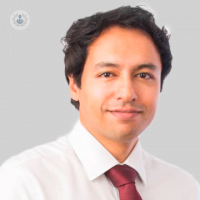The significance of multimodality imaging techniques in heart failure treatment
Written by:Imaging techniques such as ultrasound (echocardiography), cardiac computed tomography (CT) and cardiac magnetic resonance imaging (MRI) play a significant part in the diagnosis of heart failure and its treatment. Developments to improve these tests, as well as to speed them up are constantly evolving, too.
Here to discuss just how important they are is expert consultant cardiologist Dr Arjun Ghosh.

What imaging techniques are currently used to diagnose heart failure?
A number of different imaging modalities help in the diagnosis of heart failure. The initial imaging test is an echocardiogram or ultrasound of the heart. This looks at the structure of the chambers of the heart and valves. It also assesses how well the heart is contracting with every heart beat and whether there are leaking heart valves.
If further information is required regarding potential inflammation in the heart muscle or previous scar, a cardiac MRI may be requested. The MRI scan can also detect if a previous heart attack or current blockage in the heart arteries is the cause of heart failure or not. A cardiac CT can also help look at blockages in the heart arteries but can not evaluate heart structure or function.
How do imaging techniques assist in managing heart failure patients?
Heart failure is not a complete diagnosis. The underlying cause of heart failure is key e.g., problems with the heart arteries or valves, as different causes of heart failure need different treatments.
Imaging is key in determining the cause and allowing the initiation of appropriate therapy. Imaging also helps guide doctors as to the effectiveness of therapy and whether changes to treatment need to be made.
What are the advantages and disadvantages of using echocardiography in heart failure?
The advantages of echocardiography (ultrasound) are that the test is easily available and is usually very well tolerated.
The disadvantages are that obtaining optimal images can be sometimes be challenging due to past medical history (e.g., smoking, chest wall surgery) or build, physique and general shape of the body. In this situation, alternative imaging techniques are chosen e.g., cardiac MRI.
How has the use of imaging technology in heart failure diagnosis and management evolved in recent years?
More advanced imaging techniques have improved image quality which have led to improvements in diagnostic accuracy and better monitoring capabilities.
There has also been a shift to combining imaging techniques in making heart failure diagnoses and in ongoing management. This allows comprehensive diagnostic and management approaches to be utilised.
Are there any new or upcoming imaging techniques for heart failure diagnosis and management that show promise?
Recent advances in echocardiography (strain imaging) and cardiac MRI (mapping) have made it easier to make the diagnosis of heart failure at an earlier time point, leading to a prompt start of targeted evidence-based therapy.
Newer techniques are in constant development to improve sensitivity and specificity of imaging tests as well as to reduce the amount of time taken. AI (artificial intelligence) techniques are also being introduced to help with cardiac imaging analysis. I’ve been involved in research in strain, mapping and AI techniques and was the first author of the first national cardiac imaging guidelines in cancer patients.
If you require expert cardiology treatment in London, arrange a face to face or e-consultation with Dr Ghosh via his Top Doctors profile.


